Benefits Of Sunscreen: 11 Essential Reasons To Apply Daily
There are several valid reasons for using protection against UV rays, even indoors.
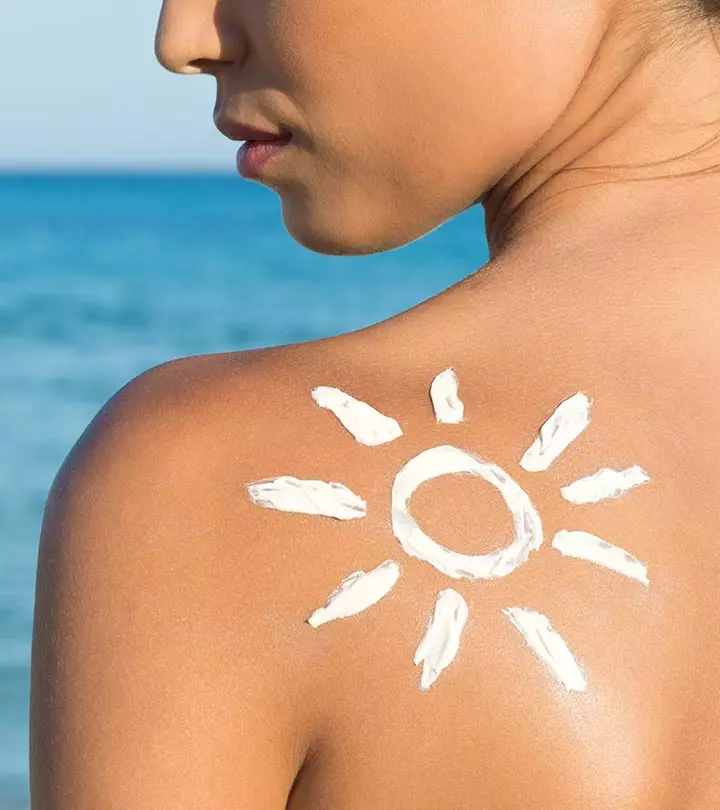
Image: Shutterstock
Why is sunscreen important, you ask? We have the answer. The benefits of sunscreen go beyond protecting your skin from the sun. Summer means it is time to run to the store to purchase sunscreen lotion. However, the truth is, we should apply sunscreen every day of the year. It does not matter whether it is summer or winter; you must protect your skin from sun exposure. SPF helps do this. Dr. Nadir Qazi, a board-certified physician, says, “Sunscreen is the most important skin care product to maintain long-term skin health. It is vital in preventing signs of aging from appearing on the skin. Fine lines, wrinkles, and sunspots are all symptoms that can arise due to a lack of proper sunscreen application.” The effects of sunscreen may not be noticeable at first, but it will pay off long-term. This article discusses the sunscreen benefits, how to use them for maximum benefits, and how often you should apply. Take a look.

 Trivia
TriviaIn This Article
Why You Should Wear Sunscreen
You should wear sunscreen for optimal skin health and avoid long-term damage. This underlines its importance in daily skincare routines regardless of whether you are heading outdoors during weather or seasonal changes or staying indoors. Sunscreen is more than just another cosmetic choice, it is a basic step in protecting your skin from harsh UV rays. Before you read through some common misconceptions, side effects and about the usage of sunscreen, take a look at the top 11 interesting reasons why you should wear sunscreen throughout the year:
1. Shields From Harmful UV Rays
The continuously depleting ozone layer has put us at a higher risk of getting affected by the harmful rays of the sun. While you do need the sun for your daily dose of Vitamin D, it does not imply that you should put your health at risk! This radiation may lead to sunburn and skin damage. Sunscreens are critical products that protect you from the harmful UV rays (1).
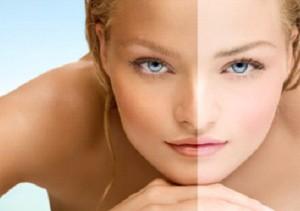
2. Prevents Premature Aging
All of us love to have younger-looking, radiant, and healthy skin. This is one of the most convincing reasons to start using sunscreen. Indulging in outdoor activities without proper sun protection may accelerate signs of aging. Prevention is key and is possible with the help of sunscreen application. It shields your skin from developing signs of aging, such as wrinkles and fine lines, sunspots, hyperpigmentationi A skin condition in which dark patches can occur in parts of the body due to increased melanin production. , photodamagei Skin changes as a result of overexposure to the sun. This causes premature skin aging, hyperpigmentation, and freckles. , (sun damage), and dry skin. Studies reveal that people below the age of 55 who used sunscreen had 24% lesser chances of developing these aging signs than non-sunscreen and occasional sunscreen users (2).
3. Lowers Skin Cancer Risk
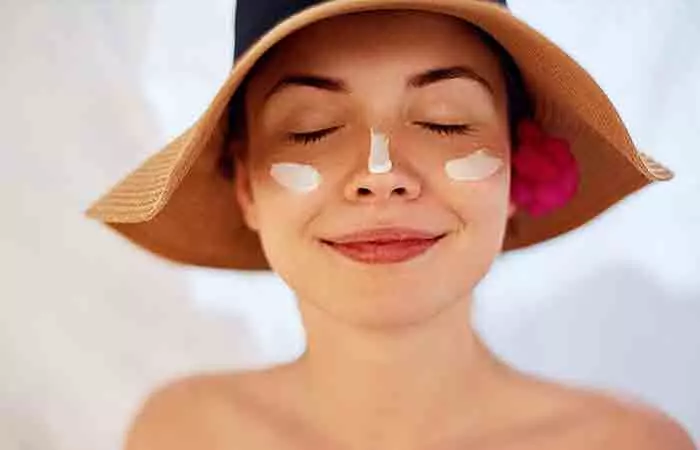
While people started using sunscreen mainly for beauty reasons, this health benefit comes as an advantage. Wear your sunscreen daily and over the days and months to shield your skin from the risk of various types of skin cancer (3). This is the worst type of skin cancer, which can be life-threatening for women as their age increases.
4. Lowers Blotchiness On The Face
Apply sunscreen liberally on your face to prevent the onset of that irritating blotchiness and eruptions of red veins. This can also prevent the onset of acne and other sun rays-induced damages caused by sun overexposure.
5. Prevents Sunburns

Sunburns can thin the skin, making it more transparent, and bruises become more visible. Your skin may experience repeated attacks of peeling, swelling, redness, hives, and itching. This is due to UVB rays, responsible for sunburns. The blisters can escalate the risk of skin cancer. A study published in ‘Annals of Epidemiology’ in August 2008 suggested that recurring occurrences of sunburns could actually put you at a higher risk of lethal melanomai Skin cancer that develops in melanin cells, which give the skin its color. The disease can spread to other parts of the body. (4).
Moreover, a survey conducted on 4,088 adults in the US found that 79.6% of the participants reported using some form of sun protection the last time they experienced sunburn. Sunscreen was found to be the most common form of sun protection used, with 38.8% of the participants using it on the face, neck, and chest. 19.9% reported using sunscreen on the body, and 8.9% reported using makeup containing sunscreen.
So, apply sunscreen and stay safe.
6. Prevents Tanning
Tan is healthy. What you should be aware of is that while you are sunbathing to tan, you are at the risk of being harmed by the harsh UVB rays. There is a popular question around it: does sunscreen prevent tanning? Yes, choose a sunscreen that has a minimum sun protection factor 30 to prevent tanning induced by UVB. Make sure you reapply sunscreen every two hours, especially if you have sensitive skin. Or apply it just after your exercise, as sweat could wash away the protective coating.
7. Enhances Health Of The Skin

The essential skin proteins, such as collagen, keratin, and elastin, are protected by sunscreen. These proteins are required for keeping the skin smooth and healthy. Make sure your sunblock has titanium dioxide in it to help reflect UV rays away from the skin and protect the activity of these proteins (5).
8. A Good Cosmetic Option
Nowadays, you get sunscreens that also double up as creams. Just apply it and leave it on. If you have dry skin or sensitive skin, make sure you reapply it every now and then for better safety of your skin.
9. A Wide Assortment To Choose
There are countless variants of sunscreens available in the market today. Plus, they come at affordable rates. You also can get sunscreen recipes online that you can prepare at home, making them even more cost effective.
10. You May Not Have To Reapply After A Swim

Most of the sunscreens or sunblocks available these days are waterproof. This enables you to enjoy yourself in the water, without burning yourself
11. Sunscreen Offers Better Protection Than A Full-Sleeved Dress
You cannot safeguard yourself from the sun by wearing a full-sleeved dress. Did you know that a cotton dress, particularly when damp, offers zero protection from the harmful rays of the sun? Just apply a generous amount of sunscreen under the dress as well.
Adding sunscreen to your daily skincare routine is probably the simplest way to prevent aging and damage caused by harmful UV rays. While you have just read through the main reasons for using sunscreen, there are still plenty of misconceptions about it. Keep reading to clear out some common myths about using sunscreen for your skin.
Key Takeaways
- Sunscreen protects our skin against harmful rays, skin aging, blotching, sun tan, and skin cancer.
- Apply sunscreen in summer and winter both and even during swimming.
- To protect your skin against sun tan when you are directly under the sun, make sure to apply sunscreen every two hours.
- Some ingredients in the sunscreen might cause skin irritation; thus, choose the product according to your skin type.
Common Myths About Sunscreens
Contrary to the above list of established benefits for sunscreen, some myths questioning their use are still making the rounds.
- Myth: Sunscreen is only required on visibly sunny days.
Truth: UV rays can pierce through most of the cloud and are just as harmful to your skin on days when the sun is out. Even dense clouds can reduce UV rays by only 50%, and still reach your skin (6). - Myth: People of color do not require sunscreen protection.
Truth: Skin color is based on the amount of melanin in the skin, but melanin can only offer up to a 50% to 75% of natural SPF (7). So you should use sunscreen irrespective of your skin tone. While people of color may have a minor level of extra protection against UV rays, photodamage and photoaging. However, high melanin levels in the skin are not sunscreen or a replacement for sunscreen. Research shows all skin types are equally vulnerable to the adverse effects of UV radiation to varying degrees (8).
Everyone can only move toward healthier skin care practices by challenging and understanding these misconceptions better. Continue reading to know how to choose your sunscreen the right way.
How To Choose A Sunscreen
So, you’re convinced about adding a sunscreen to your skin care routine. Great! But, you not sure how to choose a sunscreen that you can use every day? Here are a few factors and sun safety tips to help:
1. Always read the ingredient list and make sure your sunscreen contains the following:
- Titanium dioxide
- Octyl methoxycinnamatei A substance widely used in skin care and cosmetic formulations. It helps protect the skin from UVB rays. (OMC)
- Avobenzonei An oil-soluble ingredient used widely in chemical sunscreens. It absorbs into the skin and shields it from UVA rays. (also parsol)
- Zinc oxide
2. Opt for a broad-spectrum sunscreen lotion or gel that is non-comedogenic and hypoallergenici Substances that are used in cosmetic products, which are unlikely to cause an allergic reaction such as skin irritation or swelling. . Such sunscreens will shield you from ultraviolet rays, both A and B, while safeguarding you from rashes, clogged pores, acne, and sunburns.
3. Choose a sunscreen that is waterproof and comes with a minimum SPF of 30.
4. Always apply sunscreen half an hour before you come into contact with the sun.
5. You need to decided which type of sunscreen better suits your skin and its needs. There are two basic types of sunscreen, namely physical (mineral) and chemical variations. Physical sunscreens contain active ingredients like titanium dioxide and zinc oxide that create a physical barrier on the skin’s surface, blocking or reflecting the UV rays. They offer the most protection, as they create a literal physical separation between you and the sun.
On the other hand, chemical sunscreens absorb rays and transform them into nomical rn-damaging heat. This cheeaction in the skin minimizes the destructive effects of the sun. Most chemical sunscreens contain at least one active ingredient such as oxybenzone, avobenzone, octisalate, octocrylene, homosalate, and octinoxate.
6. Sunscreens are very essential in protecting your skin. Knowing the appropriate type of protection, the SPF level, and the resistance towards water can help you make a good decision that best suits you. Whether it is for daily or outdoor activities, sunscreen will protect your skin from any harm caused by UV.
 Fun Fact
Fun FactIt’s important to know how to use sunscreen properly to maximize its protective benefits. Choosing and applying is just the beginning of the process. Knowing how often to reapply is as important as that to make sure your skin protection lasts all through the day. Dive into the more details on its application for its best effectiveness.
How Often To Use Sunscreens
Sunscreens
act as a shield against the harmful UV rays which penetrate the skin’s barrier every time your skin is exposed to the sun. It is, therefore, advisable to use sunscreen every day. You may not notice the benefits now, but the advantage of using sunscreen is felt in the long run. If you are out in the sun for a long time either working or enjoying a sunbath on the beach or at the poolside, it is better to reapply sunscreen after every two hours to protect your skin from sunburns. Consult a dermatologist to learn more about sunscreen reapplication intervals best suited for your skin type.
While we have covered all the good things about incorporating sunscreen into your skin care routine, let’s get familiar with a few of the possible side effects too. Scroll down.
Side Effects Of Sunscreen
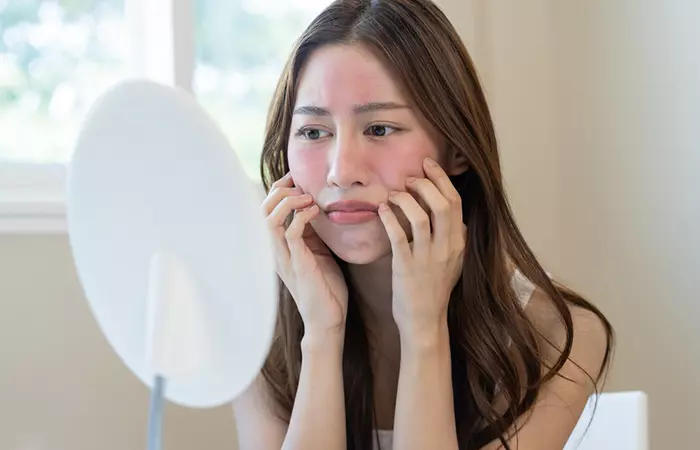
While it is certainly true that sunscreen is an essential protectant for the skin, it is also important to know its side effects. Using random sunscreen on certain skin types may lead to more harm than good. Learn more below:
- Acne Breakouts: Some sunscreens contain pore-clogging ingredients that may make your skin break out.
- Skin Irritation: Some individuals may be allergic or sensitive to certain ingredients present in sunscreens and, hence, experience inflammation, itching, and redness.
- Photosensitivity: Some individuals may experience adverse reactions due to certain ingredients that make the skin more sensitive when exposed to the sun, thereby causing sunburn or irritation.
- Increased Risk Of Cancer: Benzophenone-3 is a chemical used in many sunscreens that has been found to negatively affect estrogen levels and increase the risk of breast cancer (9).
Infographic: Benefits Of Applying Sunscreen Lotion
Sunscreen is highly beneficial for several reasons. Knowing the key reasons you should apply sunscreen throughout the year is important for protecting the skin from UV damage. Check out the infographic below to learn how sunscreen protects the skin from the harmful effects of UV exposure. Illustration: StyleCraze Design Team
Hopefully, now you will stop wondering, “Is sunscreen good for skin?” because it is good, and applying sunscreen regularly across seasons comes with a host of benefits. These include protection from harmful UV rays, reducing signs of premature aging, preventing sunburns and tanning, and lowering the risk of developing skin cancer. Before you use sunscreens, always select broad-spectrum lotions that are waterproof and contain ingredients such as zinc oxide and titanium dioxide. To enjoy the long-term benefits of sunscreen, apply sunscreen regularly half an hour before going out and every 2 hours to avoid sunburns and enjoy smooth, healthy, and glowing skin.
Frequently Asked Questions
Why is sunscreen important even at home?
Dr. Hamdan Abdullah, a board-certified dermatologist, says, “It is important to wear sunscreen even at home as windows and other materials can allow UV rays to penetrate indoors. Moreover, if you work near windows or spend time outdoors, you may still be exposed to UV radiation. Thus, it is essential to use sunscreen regularly to protect your skin.”
Dr. Qazi adds, “Sunscreen is important anywhere there is ambient light. UV rays are not just found at the beach or on your local hike. There are two main types of ultraviolet radiation that affect our skin: UVA and UVB rays. UVB radiation levels increase during the hotter months and, most of the time, can be avoided in the shade. UVA is everywhere – everywhere that there is ambient light, in the shade, in buildings, during the winter and cooler months. Both types of radiation cause sun damage and can lead to severe health issues like skin cancer. It is crucial to apply sunscreen in the morning, reapply regularly throughout the day, and remove it at night before bed to help prevent skin cancer and premature aging due to sun damage.”
Can I skip moisturizer and use sunscreen?
Dr. Qazi says, “A chemical sunscreen should be applied before a moisturizer, and a mineral sunscreen should follow moisturizer in a skin care routine, but sunscreen is not a replacement for a nourishing moisturizer. Your skin type also plays a part in whether or not you should skip the moisturizer. People with more oily skin can apply moisturizer as a protective barrier to ensure the skin is hydrated and protected.” Nonetheless, there are some carefully formulated products that may enhance sunscreen’s overall skin protection properties.
Dr. Crystal Dinopol, MD, a dermatologist, adds, “There are a lot of sunscreens with added benefits like hyaluronic acid, niacinamide, ceramides, and so on that can replace your moisturizer in your morning routine. This saves a lot of time and money for most people who are busy and trying to maximize their skin care products.”
Should I wear sunscreen on rainy days?
Dr. Qazi says, “Sunscreen should still be worn on rainy days due to UVA rays still being prevalent even through the clouds.” Dr. Dinopol adds, “Sunscreen should be worn regardless of the weather. Clouds and rain do not block out UVA, which causes aging signs, and UVB, which causes sunburns.”
Can we apply sunscreen after moisturizer?
It is always good to apply sunscreen after you are done with your skin care regime as using serums or moisturizers over your sunscreen will affect the amount of protection it provides.
Can I use sunscreen while pregnant?
It is important to wear sunscreen while you are pregnant. Use one with at least an SPF of 30. Also, not all sunscreens are safe. There are many chemical sunscreens whose constituents can enter your bloodstream and can affect your fetus. It can also cause skin irritations and allergic reactions. Instead, use a natural sunscreen.
How long does sunscreen last once applied?
It usually lasts up to two to three hours, depending on the SPF. Ideally, the sunscreen should be applied 30 minutes before the skin is exposed to the sun. This allows the ingredients to bind to the skin properly. So, reapplying the sunscreen is as important as putting it on. Reapply it every two hours.
Does sunscreen over 30 SPF work?
Yes, sunscreens between SPF 30 and 50 work. However, there is only a tiny difference, SPF 30 protects against approximately 96% of UV rays whereas SPF 50 gives 98% protection from the sun. Therefore, a higher SPF does not necessarily mean greater protection.
What does the SPF number of sunscreen lotions mean?
The SPF refers to the ability of a sunscreen to block UVB rays that can cause sunburns, as well as UVA rays, that can cause deeper skin damage. The higher the SPF number, the higher the protection. But none provides 100% protection. The number shows the length of time your skin will be protected from burning, depending on your skin type. Check for the first sign of reddening in the sun without any protection (for eg., 3mins). Multiply that number by the SPF, that is, 50 * 3 (if the SPF is 50) = 150 minutes of sun protection.
Does expired sunscreen work?
All sunscreens have an expiration date mentioned on the bottle. The usual shelf life of a sunscreen is up to two to three years. However, you can still use it slightly over three years.
Illustration: Reasons Sunscreen Is Important For The Skin & How To Use It
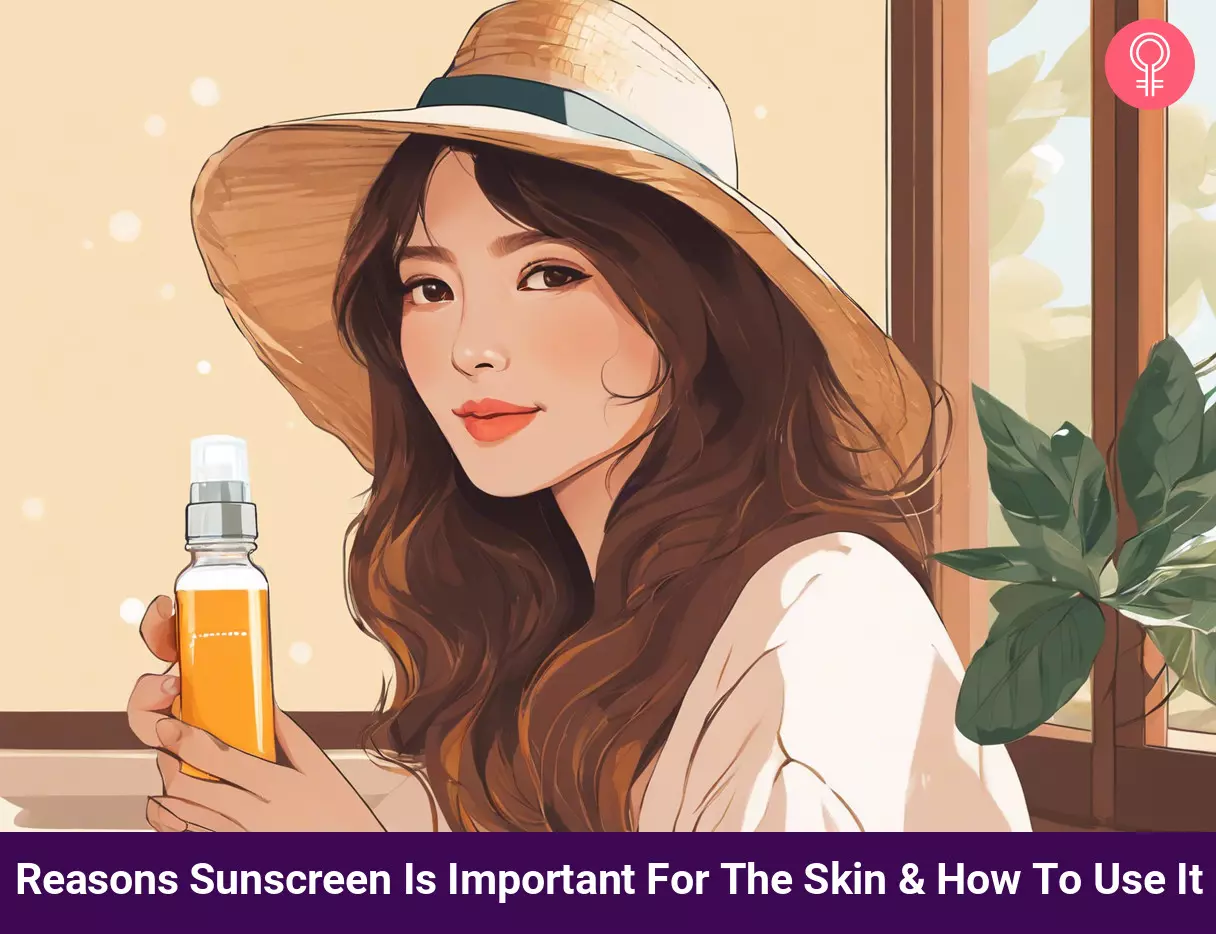
Image: Stable Diffusion/StyleCraze Design Team
Learn from a dermatologist as they reveal 10 common sunscreen mistakes to avoid. Discover the correct amount to apply and gain valuable insights for effective sun protection in this informative video.
Personal Experience: Source
StyleCraze's articles are interwoven with authentic personal narratives that provide depth and resonance to our content. Below are the sources of the personal accounts referenced in this article.
i. Sunscreen fails of 2017 – what did not work out for me and whyhttps://adventuresofaceliacinnyc.blogspot.com/2018/01/sunscreen-fails-of-2017-what-did-not.html
References
Articles on StyleCraze are backed by verified information from peer-reviewed and academic research papers, reputed organizations, research institutions, and medical associations to ensure accuracy and relevance. Read our editorial policy to learn more.
- Sunscreen products Rationale for use formulation development and regulatory considerations
https://www.ncbi.nlm.nih.gov/pmc/articles/PMC6978633/ - Sunscreen and Prevention of Skin Aging A Randomized Trial
https://www.researchgate.net/publication/237016903_Sunscreen_and_Prevention_of_Skin_Aging_A_Randomized_Trial - The efficacy and safety of sunscreen use for the prevention of skin cancer
https://www.cmaj.ca/content/192/50/E1802 - Sunburns and Risk of Cutaneous Melanoma Does Age Matter? A Comprehensive Meta-Analysis
https://www.sciencedirect.com/science/article/abs/pii/S104727970800094X - Sunscreens–the ultimate cosmetic
https://www.ncbi.nlm.nih.gov/pmc/articles/PMC3364536/ - Environmental Cues to Ultraviolet Radiation and Personal Sun Protection In Outdoor Winter Recreation
https://www.ncbi.nlm.nih.gov/pmc/articles/PMC3364536/ - The Protective Role of Melanin Against UV Damage in Human Skin
https://pubmed.ncbi.nlm.nih.gov/18435612/ - The importance of cosmetically elegant sunscreen in skin of color populations
https://onlinelibrary.wiley.com/doi/full/10.1111/jocd.14409 - Benzophenone-3 promotion of mammary tumorigenesis is diet-dependent
https://www.ncbi.nlm.nih.gov/pmc/articles/PMC7721615/
Read full bio of Dr. Schwarzburg
- Dr. Crystal Dinopol, DPDS, is a clinical dermatologist who specializes in esthetic and pathologic skin disorders. She is a member of the Philippine Dermatological Society and has helped many patients with acne, eczema, and hair and nail disorders. She is also an advocate for psoriasis and leprosy in her locality.
 Dr. Crystal Dinopol, DPDS, is a clinical dermatologist who specializes in esthetic and pathologic skin disorders. She is a member of the Philippine Dermatological Society and has helped many patients with acne, eczema, and hair and nail disorders. She is also an advocate for psoriasis and leprosy in her locality.
Dr. Crystal Dinopol, DPDS, is a clinical dermatologist who specializes in esthetic and pathologic skin disorders. She is a member of the Philippine Dermatological Society and has helped many patients with acne, eczema, and hair and nail disorders. She is also an advocate for psoriasis and leprosy in her locality. - Dr. Nadir Qazi, DO, has over 6 years of experience in cosmetic dermatology and plastic surgery. He is a member of the American Academy of Cosmetic Surgery and an instructor for advanced injections and laser techniques. He is well-known among celebrities and elite models for his promising liposuction results and his innovative facial contouring technique known as the HD Lift™.
 Dr. Nadir Qazi, DO, has over 6 years of experience in cosmetic dermatology and plastic surgery. He is a member of the American Academy of Cosmetic Surgery and an instructor for advanced injections and laser techniques. He is well-known among celebrities and elite models for his promising liposuction results and his innovative facial contouring technique known as the HD Lift™.
Dr. Nadir Qazi, DO, has over 6 years of experience in cosmetic dermatology and plastic surgery. He is a member of the American Academy of Cosmetic Surgery and an instructor for advanced injections and laser techniques. He is well-known among celebrities and elite models for his promising liposuction results and his innovative facial contouring technique known as the HD Lift™.
Read full bio of Jyotsana Rao
Read full bio of Ramona Sinha
Read full bio of Swathi E






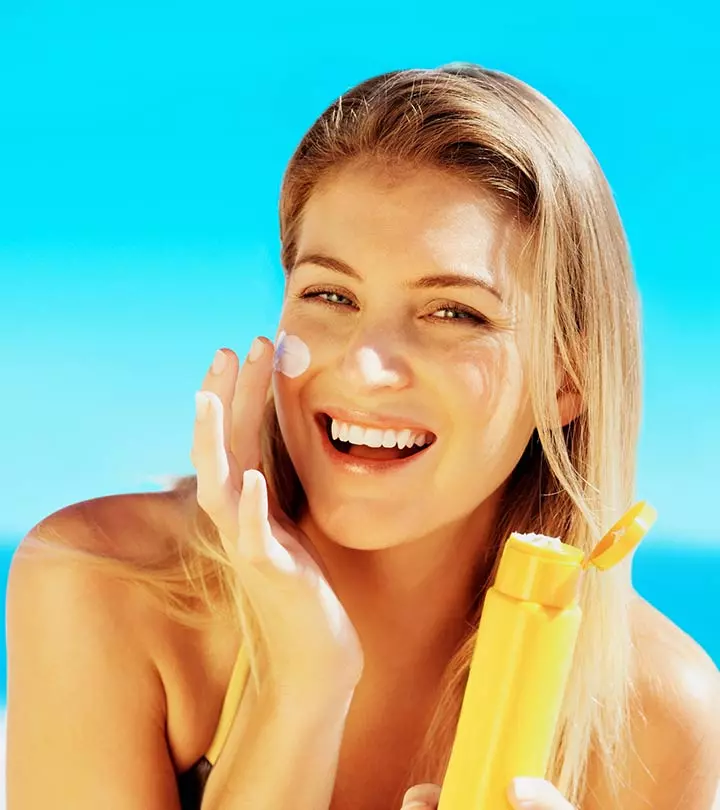
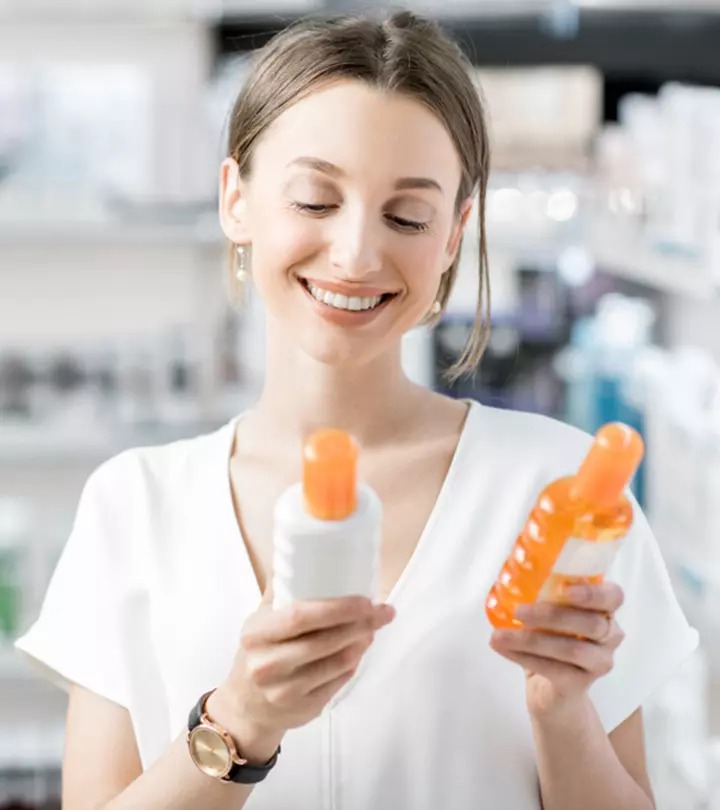

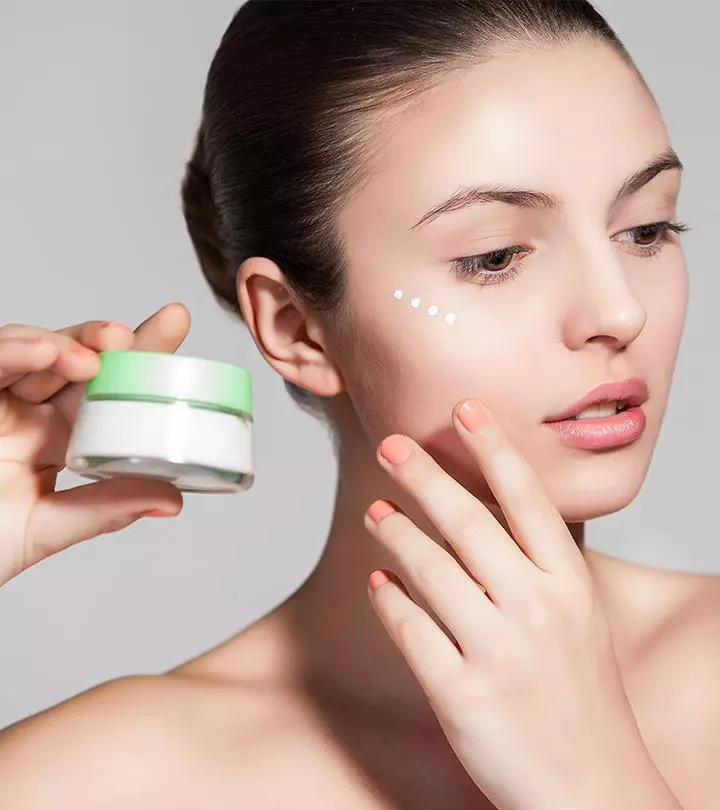

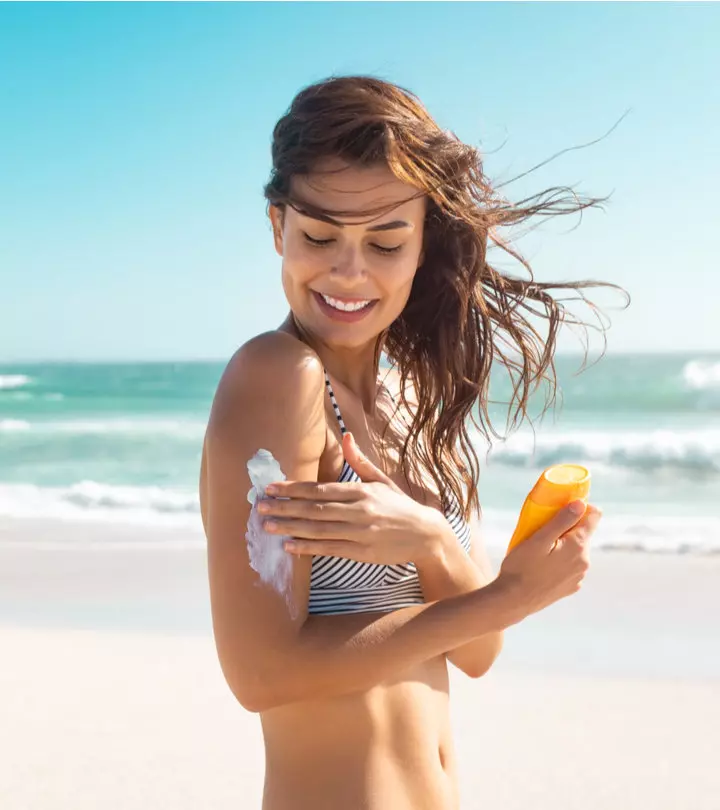
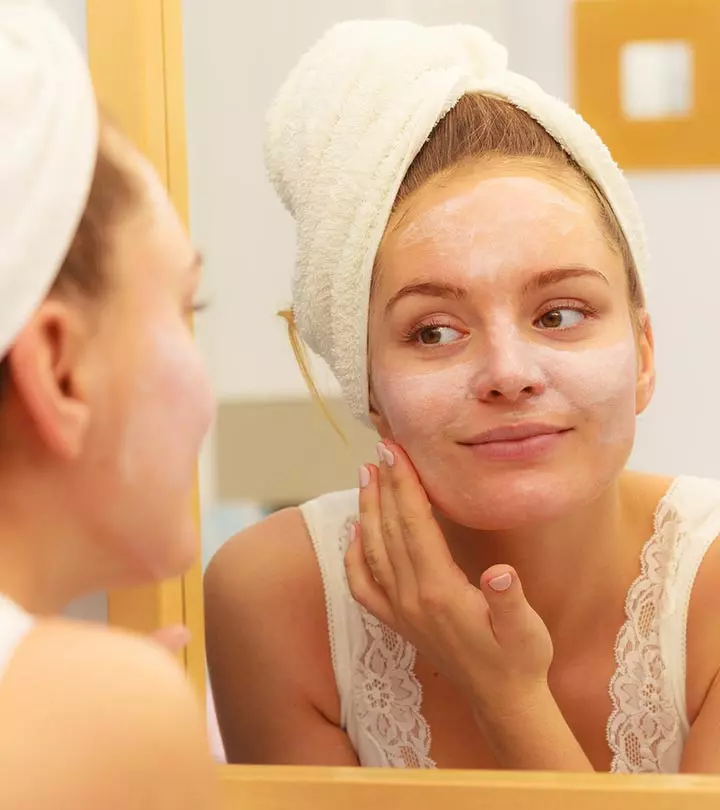
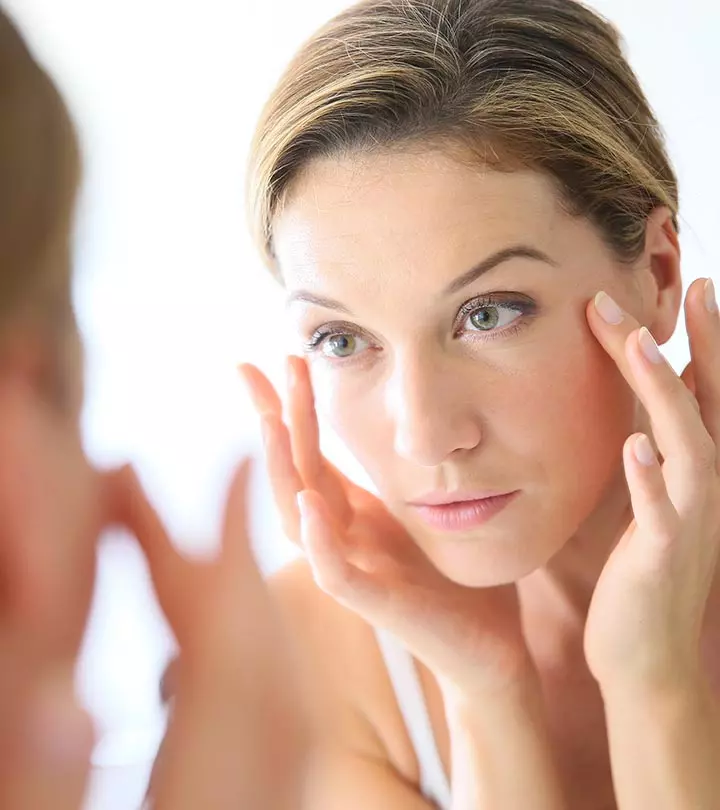
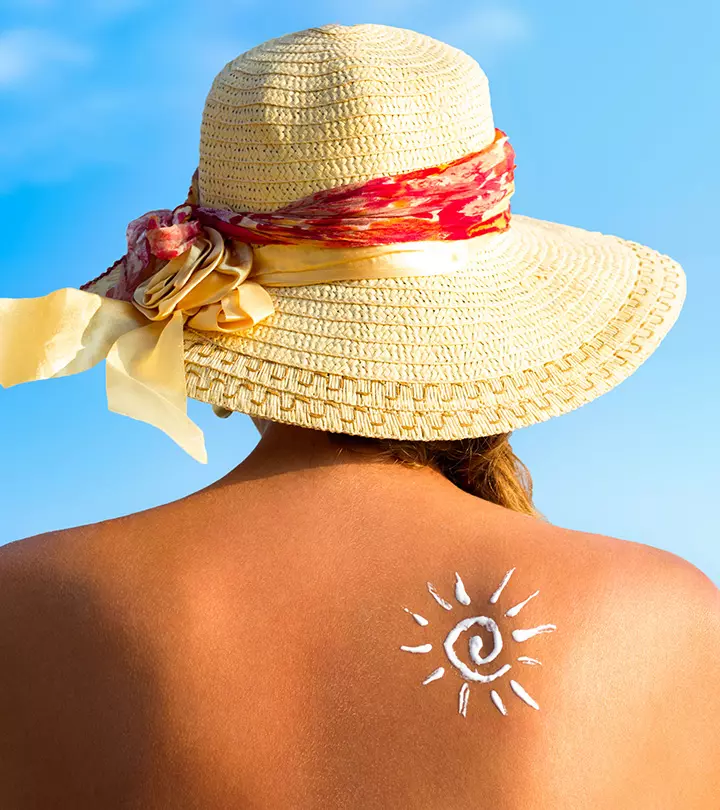
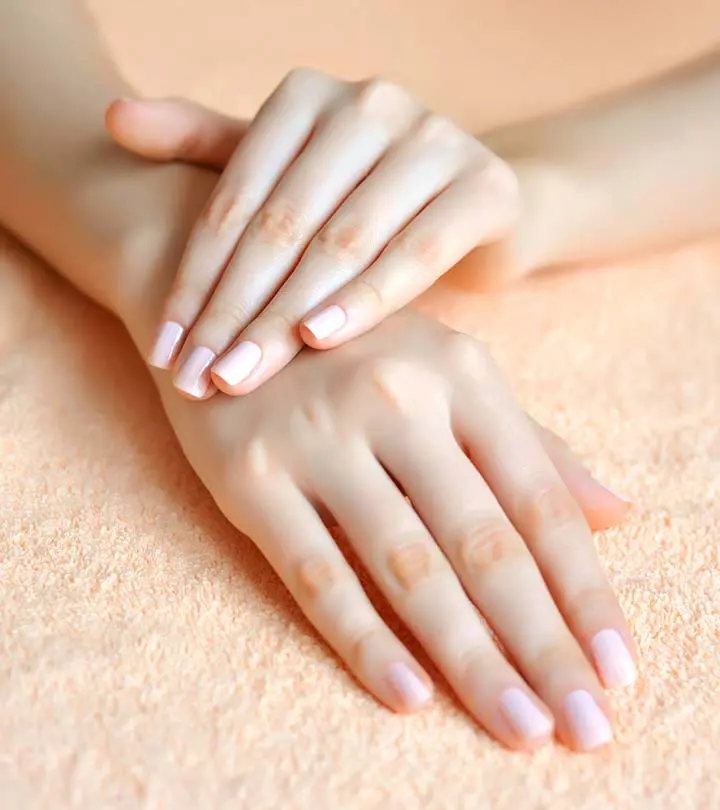
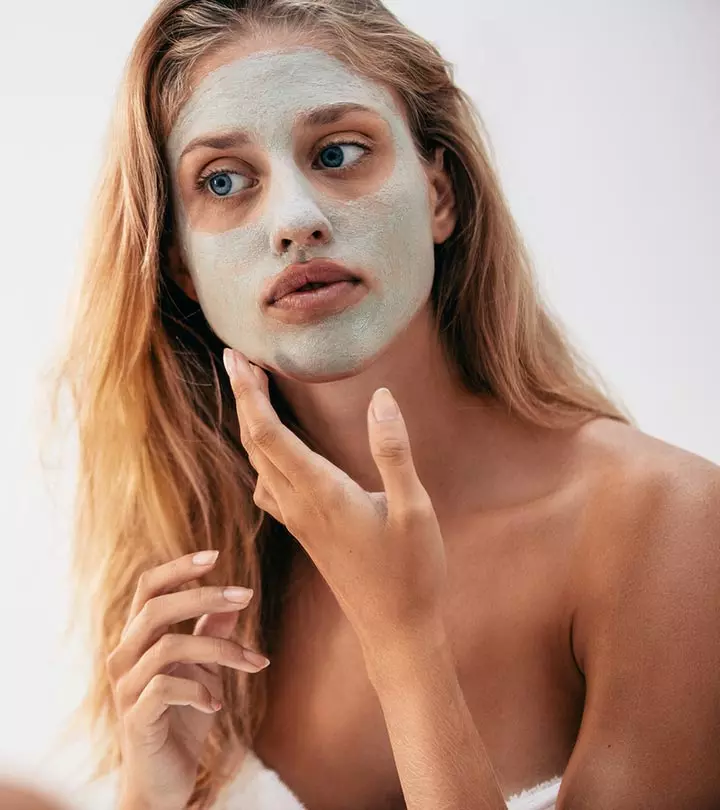

Community Experiences
Join the conversation and become a part of our empowering community! Share your stories, experiences, and insights to connect with other beauty, lifestyle, and health enthusiasts.